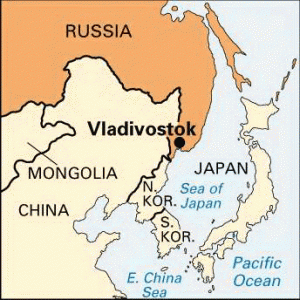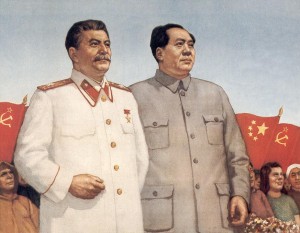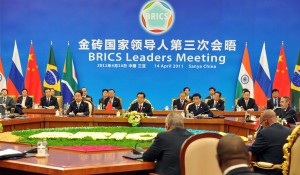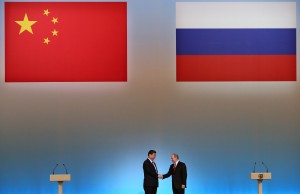By Yigit Topcu
The relationship between Russia and China is long and complicated. Interactions between the two has been chiefly characterized by a mutual sense of distrust, which at times turned to outright hostility, or a strategic/reluctant partnership. The dynamics of this relationship are influenced primarily by their cultural and national identities, a history of hostility or cooperation depending on the circumstance, their economic goals and conditions, and their geopolitical goals.
The history between China and Russia can point to us the governing factors of their relationship. Beijing and Moscow achieved contact for the first time in history in the early 1600s, when the Russian Empire began its expansion towards East Asia. Russian settlers attempted to expand into territory claimed by the Qin dynasty, which lead to some small conflicts to arise at first. Eventually they made peace by agreeing on a border, and even agreed to allow direct trade between the Russian settlers and Beijing – a rare agreement between China and Europe at this time.
For almost two centuries this peaceful relationship went uninterrupted, until Western imperialism came to China in the mid-1800s. This was around the time of the Opium Wars, and European powers were pressuring China into signing unequal and unfair trade agreements.
Russia became one of those European powers pressuring China to sign such treaties. To make matters worse for China, this wave of imperialism was occurring at the time of the Taiping Rebellion, a rebellion/civil war in China which, to this day, is one of the most bloody conflicts in world history – the Taiping Rebellion claimed more lives than even World War I.
Taking advantage of China’s unstable condition, Russia went further than the unequal treaties and expanded into areas beyond the previously agreed upon borders. In fact, the Russian territory which  currently exists between North-East of China and North-West of Japan was acquired during this time.
currently exists between North-East of China and North-West of Japan was acquired during this time.
Interestingly, this centuries-old annexation has come up multiple times as arguments come and go between Beijing and Moscow. It is a continued source of mistrust and hostility.
From this brief history of China and Russia we can perhaps see the roots of their present-day relationship. Typically speaking, two countries which had peaceful standings for almost two hundred years do not turn against each other so easily: such is not the case in Russia-China relations. Their relationship is governed purely out of convenience and strategy.
Part of this has to do with how China and Russia view each other, as well as how they view themselves. Their national identities are not very related to each other.
Often times cooperation or warm relations between countries can be based on a sense of common heritage or culture. Europe and the United States, the European Union, United States and Canada, the Arab League, the Nordic Council, Turkey and Azerbaijan, the United States and United Kingdom, and so on, are some examples of this. Russia and China do not have have such common ground.
China views Russia as culturally distant and more similar to other European nations. China’s history of mistrust towards European powers contributes to how they view Russia.
Russia, on the other hand, has always been in an interesting spot in terms of national identity. They do not view themselves as being close to Chinese culture, but they do not see themselves as fully European either. In fact, historically there has always been something of a cultural gap between Russia and Europe.
To many in Western Europe, Russia was and is a place that is both European and not European.
This conflict over Russia’s identity has been influencing Russian politics for some time. Czar Peter the Great once famously banned traditional Russian beards to emulate the fashion of Western Europe.
It is important to notice that this is not just a historical observation.
In Russian politics today this is an issue that does come up. Some Russian politicians and commentators advocate leaning West-ward, some East-ward, and others want to embrace Russia’s unique identity and do away with the East-West identity politics altogether.
Do such identity politics influence Russia’s relationship with the West? For that we only need to remind ourselves of Crimea’s annexation in 2014 or the decades-long Cold War or their rivaling positions regarding the Syrian Civil War.
During the Cold War, the Soviet Union’s relationship with the People’s Republic of China was also governed by these themes. Russia under Joseph Stalin and China under Mao Zedong acted as allies leading the communist world. China even endured sanctions from the United Nations over their involvement in the Korean War, siding with the Soviets.
these themes. Russia under Joseph Stalin and China under Mao Zedong acted as allies leading the communist world. China even endured sanctions from the United Nations over their involvement in the Korean War, siding with the Soviets.
However, after Stalin, a series of Russian leaders pushed de-Stalinization and rolled back on Stalin’s policies and influence. Some even advocated increased cooperation with the West. Such changes infuriated Mao, and a period known as the Sino-Soviet split followed. The relationship between Russia and China became so bad at this time that they became outright hostile towards each other, reigniting old border disputes and leading to several violent clashes.
Now that the nature of their relationship is established, what does all of this mean for the United States and the world in the present, and possibly in the future?
It is true that Russia and China view each other with suspicion, but it is also true that they are known to work together if their interests align. Their recent actions, such as jointly blocking UN security council resolutions to intervene in the Syrian civil war, or signing massive energy agreements (while Russia faces sanctions over Crimea) are a testament to this.
Typically they do not get involved much in each other’s activities, but they have a mutual interest in suppressing the West’s ability to meddle in their affairs. Russia has problem areas such as Chechnya and Crimea, and their geopolitical goals are seemingly focused on getting NATO away from their borders. Meanwhile China has Tibet and Hong Kong, as well as their ongoing dispute over islands with several other countries in Southeast Asia.
There are also more domestic issues such as their joint tendency to suppress dissidence or journalists. All of this means that Russia and China have a mutual interest in waning international capabilities to meddle in such activities.
Towards each other, China and Russia rarely show any interest in the other’s specific problems. For example, when Russia annexed Crimea, China offered a neutral statement which did not side with Russia or the West. Likewise Russia has shown no interest in China’s concerns such as island disputes or Hong Kong.
Their largest mutual concern seems to be to just keep the United States and its allies off their backs.
This means that politically they align in a number of ways, but another crucial factor in their relationship is their economic standings. This plays a unique sort of barrier in how they can act. While China and Russia have similar political interests, their economic situations make political cooperation difficult.
China is currently the largest economy in the world. China is also Russia’s single largest trading partner, especially after Western sanctions in response to Crimea, while Russia is China’s ninth largest partner in trade. This limits how much China can ally itself with Russia.
China’s trade with Russia in 2012 was valued at $88 billion. On the other hand, that same year, China’s trade with the European Union was worth $546 billion, making the EU their largest trading partner. The US is in second place for China, with $484 billion, and in third place is Japan, a political rival of China and one which aligns with the US, worth $329 billion.
The fact that these massive and crucial economic relationships all exist with countries that are potential political rivals of the Russia-China partnership creates a restrain on China’s abilities to support a strategic partnership. Any kind of confrontation could threaten these crucial economic ties.
Furthermore, because of the immense size of the Chinese economy, the balance of power in the China-Russia relations heavily leans towards China, meaning China will have the upper hand in their negotiations with Russia. This is very apparent in the politics of the international group called BRICS.
BRICS is an acronym for Brazil, Russia, India, China, and South Africa. These are five countries which are viewed as emerging economies in the 21st century, and they have a loose international coalition with the goal of increasing mutually beneficial economic relations. The leaders of the five countries meet annually.
The internal politics of this group evidences a relationship between the five countries that is similar to one we’ve seen, based more on strategic partnerships than any deeper sense of alliance. There is considerable mistrust and disagreement between them, but also some cooperation.
The BRICS desire creating a multi-polar world. Polarity in international relations refers to how power is distributed in the international system. We currently live in a uni-polar world, lead by the United States and the West. The Cold War was a bi-polar world, split between the United States and the Soviet Union. A multi-polar world would mean international power and influence split between more than two sides. This is why the BRICS includes a country from each continent.
Creating new centers of international influence would mean that the BRICS have to create their own version of a World Bank or the International Monetary Fund, both of which are international financial organizations that are controlled primarily by the West. After almost a decade of slow negotiations, the BRICS bank was finally created in 2015. Why the negotiations took so long says a lot about the kind of position China finds itself in.
In the World Bank and the IMF, the amount of influence each country gets is based on the amount of money they put into the system. This has caused the West to dominate both institutions, as they can afford to have a greater say. Interestingly, China wanted the same system for the BRICS bank, where power is determined by a country’s level of contribution.
This would have lead the way for a China-dominated BRICS international bank. This was a position which China insisted for a decade before they gave up.
Brazil, India, Russia and South Africa won the argument, and an equal amount of power is now given to each member country in the BRICS Development Bank. However, as part of China’s terms for conceding their demand, the BRICS bank is currently headquartered in Shanghai. This was certainly meant as a symbolic victory for China’s ambitions.
From Russia’s perspective, a Western-lead world is not much better than potential a Chinese-lead one.
Overall the relationship between Russia and China is sure to become more and more important to pay attention to in the 21st century. Their ambitions, goals, partnerships, hostilities and conflicts all paint a complicated but important relationship in the years to come.
In many ways their interactions have been mostly pragmatic since day one, and I would argue that this is still how they deal with each other. It remains to be seen if circumstances might allow a long-lasting or influential relationship between China and Russia.
It is unlikely that China-Russia relations will play out as simply the two leading a global push to oppose the West. If there ever was a time when things could work this simply, the Cold War would have been it. Yet China-Russia relations were barely characterized by solidarity against the West during that time.
A strong partnership between China and Russia would have the potential to counter the predominance of American hegemony, but while we analyze their similarities and capabilities, we must not ignore their differences and limitations. It remains to be seen how they will overcome their differences, or fail to do so. Overcoming their differences can lead to the waning of Western influence and the creation of a multi-polar, or at least bi-polar, world. Failure to do so will mean their continued reluctant coexistence with Western powers, in which they are not the ones fully in control.

